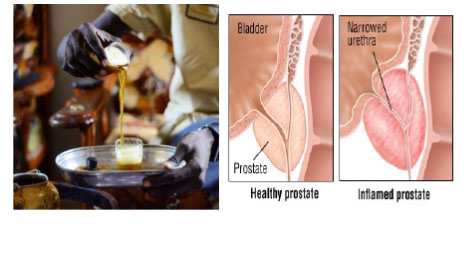
 Especially for black men, living long enough means you are going to have problems with your prostate. While the prostate is typically a small, walnut-sized gland in young males, it undergoes two phases of growth later on in life which often result in urinary problems. The first phase of growth occurs during puberty and usually doubles the size of the gland, while the second phase of growth begins at around 25 and continues for the rest of your life leading to benign prostatic enlargement (benign prostatic hyperplasia or BPH).
Especially for black men, living long enough means you are going to have problems with your prostate. While the prostate is typically a small, walnut-sized gland in young males, it undergoes two phases of growth later on in life which often result in urinary problems. The first phase of growth occurs during puberty and usually doubles the size of the gland, while the second phase of growth begins at around 25 and continues for the rest of your life leading to benign prostatic enlargement (benign prostatic hyperplasia or BPH).
More than 50 percent of men have BPH by the age of 60 and experience urinary difficulties. Although prescription medications are commonly used to treat BPH, herbal supplements may provide much-needed relief during the initial stages of the condition. One such herbal solution is green tea which is the ingredient in Gambian attaya.
I found that it appears we are drinking for the sake of drinking. But attaya goes more than just drinking for men. Do you know that both green tea and hibiscus tea are among the top drinks for prostate health? Both types of tea contain potent antioxidants. Studies show that green tea can help prevent prostate cancer from forming and may also slow the growth of aggressive prostate cancer. Studies show that green tea can also benefit men with BPH and prostatitis.
Let us explore some of the benefits in detail:
Green Tea
Green tea comes from the plant Camellia Sinensis. The two main varieties of tea plants are Camellia sinensis, a small-leaf variety native to China, and Camellia sinesis assamica, a large-leaf variety that was first discovered in the Assam district of India. Hundreds of cultivars and hybrid plants have evolved from these two plant varieties over time.
Green Tea Ingredients
Without sugar, green tea is not only the second most popular beverage across the globe but also a pleasant alternative to soft drinks and coffee. It contains potent polyphenols, catechins with anti-inflammatory, anti-carcinogenic, and antioxidant properties. The active ingredients in green tea include gallic acid, caffeic acid, chlorogenic acid, and epigallocatechin (EGC), among other polyphenols.
The polyphenol known as epigallocatechin-3-gallate (EGCG) is effective in reducing the overproduction of cells common in BPH and in preventing the onset of prostatic enlargement. Other specific polyphenols found in green tea can treat the symptoms and eradicate various causes of BPH, making green tea irreplaceable for managing the condition alongside lifestyle changes, medications, and other interventions.
Green Tea, Prostate Health
Green tea contains antioxidants that reduce the levels of dihydrotestosterone (DHT), the hormone that promotes the growth of the prostate. A reduction in the levels of DHT decreased the risk of developing an enlarged prostate. The catechins in green tea regulate the secretion of DHT and PSA, promoting normal prostate size and volume and reducing the risk of BPH.
Also, the catechins in green tea have been proven in science theirefficacy in relieving urinary symptoms such as frequent urination, nighttime urination, and problems with urinary flow. Improved urine flow, relief of annoying urinary symptoms, and reduced prostatic inflammation lead to a higher quality of life. Apart from this, the catechins in green tea can kill certain viruses and bacteria, reducing the risk of urinary tract infections that may occur in men with an enlarged prostate. One study Tepedelen et al.(2017)found that EGCG reduced the over-production of cells which happens during the development of an enlarged prostate.
Also,chronic prostatitis, or inflammation of the prostate gland, is another prostate condition that could be soothed by a polyphenol in green tea – this time the bioflavonoid quercetin(Khan and Mukhtar, 2013).
An earlier study by Shoskes DA, et al. (1999) in Urology found that around two-thirds of men with prostate problems like chronic prostatitis who took quercetin every day saw their symptoms improve by at least 25%.
Factors affecting the effectiveness of Attaya
Dr. Reid Graves, Dr. Nicholas Laryngakis, and Dr. Adam Oppenheim of St Pete Urology, board-certified urologists explained that the strength and effectiveness of green tea depend on the amount of the tea consumed. Studies have shown that men who take large quantities of green tea regularly enjoy more prostate health benefits from the tea than those who take the tea irregularly or in small amounts. The amount of catechins in green tea also depends on where the plants are grown, how the tea leaves are harvested, and how the leaves are processed. For instance, Japanese green teas usually have greater quantities of catechins than Chinese teas, with slight differences within specific groups. Remember that the power of green tea comes from the fact that its leaves are not oxidized and can retain essential substances such as catechins that promote both general health and prostate health.
Attaya, warnings
Gegbe et al. (2015) study found that if attaya is not boiled the right way or excess consumption, or mixed with another product as in the case of Sierra Leone, it can lead to many health implications. Additionally, Poor hygiene at attaya bases has high risks of Cholera and Tuberculosis (TB), although attaya bases enhance Love and Unity across the country.
Also, in Ghana, The ministry for national security has warned the public about brands that are unwholesome for public consumption. So in choosing, opt for quality brands approved by the FDA.
Green tea can cause side effects due to caffeine. These can include anxiety, tremors, irritability, and sleeping problems. This is more likely if you’re sensitive to caffeine or take large doses, Green tea extracts may cause liver problems. Symptoms can include yellowing of your skin or the whites of your eyes, nausea, and stomach pain. The negative effects of green tea extract on the liver may depend on how much green tea extract you consume each day.
Also, it is important to choose caffeine-free sources of tea, though. Caffeine can irritate both the prostate and the bladder. A study found that men who consumed 234 mg or more of caffeine each day were 72 percent more likely to experience urinary incontinence compared to men who drank the least amount of caffeine. If you have urinary or pain symptoms due to prostatitis, caffeine can make these symptoms worse. If you have BPH or prostatitis, make an effort to reduce your caffeine intake by cutting back on coffee, soda, or energy drinks. Avoiding caffeine can make a big difference in your urinary health
Green tea contains small amounts of vitamin K. This means it may decrease how well blood thinner medicines work. Since green tea acts as a mild stimulant, you shouldn’t use it with other stimulants. It may change the effects of other medicines.
Conclusion
There are many benefits to drinking attaya. My only concern is how sugar is added in the Gambia. But without adding sugar, attaya drinking may also have positive effects on the prostate gland. However, its association with prostate health is primarily due to research that connects it to protection against prostate cancer, not prostate enlargement.
For instance, Katz et al.(2014) study found that people with known or suspected BPH did link improved lower urological health with the consumption of a green and black tea extract supplement. In this study, the researchers found that people who were supplemented with 500 milligrams (mg) or 1000 mg of a green and black tea extract blend showed improved urine flow, decreased inflammation, and improvements in quality of life in as little as 6 weeks.
However, green and black tea extracts are highly concentrated and will have different health effects than traditionally brewed teas. Despite limited evidence on enlarged prostate, adding green tea to your diet could have prostate health benefits. It has known chemoprotective abilities, especially in the case of prostate cancer, so green is a good choice regardless(Henning et al. 2011).
Also, Kurahashi et al.(2008) study found that men drinking green tea had a lower risk of advanced prostate cancer.
Finally, a recent study by Sharifi-Zahabi et al. (2021) evaluate the effects of green tea on the PSA level, by conducting a systematic review and meta-analysis of randomized controlled trials and found no effect.
Drinking three to five cups of attaya per day seems to be optimal to reap the most health benefits.Try to choose a higher quality brand of green tea, because some of the lower quality brands can contain excessive amounts of fluoride (Lu et al. 2004).
So imagine that we could be improving our prostate health by just drinking sugar-free attaya. This is because green tea and hibiscus tea are among the top drinks for prostate health. Both types of tea contain potent antioxidants. Studies show that green tea can help prevent prostate cancer from forming and may also slow the growth of aggressive prostate cancer. Studies show that green tea can also benefit men with BPH(enlarge prostate) and prostatitis. Always remember not to add sugar to your attaya or better still buy green tea.
NB:
Prof. Nyarkotey has strict sourcing guidelines and relies on peer-reviewed studies, academic research institutions, and medical associations to justify his write-ups. My articles are for educational purposes and do not serve as Medical advice for Treatment. I aim to educate the public about evidence-based scientific Naturopathic Therapies.
The writer is a Professor of Naturopathic Healthcare, a Medical Journalist, and a science writer. President, Nyarkotey University College of Holistic Medicine & Technology (NUCHMT)/African Naturopathic Foundation, Ashaiman, Ghana. E. mail: professor40naturopathy@gmail.com.
Read Other Articles In Feature

THANK YOU TIMBOOKTOO BOOKSHOP MANAGEMENT The Sacred Alchemy of Knowledge and Community
Jan 10, 2025, 11:54 AM




